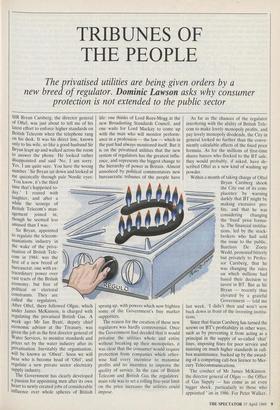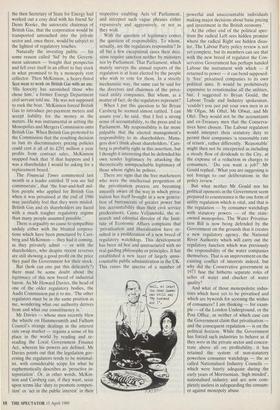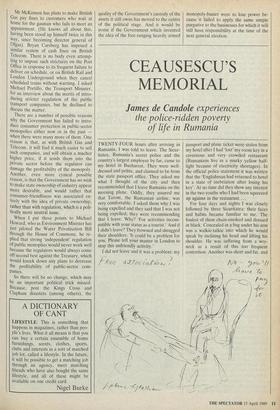TRIBUNES OF THE PEOPLE
The privatised utilities are being given orders by a protection is not extended to the public sector
SIR Bryan Carsberg, the director general of Oftel, was just about to tell me of his latest effort to enforce higher standards on British Telecom when the telephone rang on his desk. It was his direct line, known only to his wife, so like a good husband Sir Bryan leapt up and walked across the room to answer the phone. He looked rather disappointed and said 'No, I am sorry. Yes, I am quite sure. You have the wrong number.' Sir Bryan sat down and looked at me quizzically through pale Nordic eyes: 'You know, it's the third time that's happened to- day.' I roared with laughter, and after a while the scourge of British Telecom's man- agement joined in, though he seemed less amused than I was.
The Government has clearly developed a passion for appointing men after its own heart to newly created jobs of considerable influence over whole spheres of British life: one thinks of Lord Rees-Mogg at the new Broadasting Standards Council, and one waits for Lord Mackay to come up with the man who will monitor perform- ance in a profession — the law — which in the past had always monitored itself. But it is on the privatised utilities that the new system of regulators has the greatest influ- ence, and represents the biggest change to the hierarchy of power in Britain. Almost unnoticed by political commentators new bureaucratic tribunes of the people have sprung up, with powers which now frighten some of the Government's free market supporters.
The reason for the creation of these new regulators was hardly controversial. Once the Government had decided that it would privatise the utilities whole and entire without breaking up their monopolies, it was clear that the consumer would require protection from companies which other- wise had every incentive to maximise profits and no incentive to improve the quality of service. In the case of British Telecom and British Gas the regulators' main role was to set a rolling five-year limit on the price increases the utilities could impose. As far as the chances of the regulator interfering with the ability of British Tele- com to make lovely monopoly profits, and pay lovely monopoly dividends, the City in general looked no further than the conve- niently calculable affects of the fixed price formula. As for the millions of first-time shares buyers who flocked to the BT sale, they would probably, if asked, have de- scribed Oftel as a new kind of washing up powder.
Within a month of taking charge of Oftel Bryan Carsberg shook the City out of its com- placency by warning darkly that BT might be making excessive pro- fits, and that he was considering changing the 'fixed' price formu- la. The financial institiu- tions, led by the stock- brokers who had sold the issue to the public, Barclays De Zoete Wedd, protested bitterly but privately to Profes- sor Carsberg, that he was changing the rules on which millions had based their decision to invest in BT. But as Sir Bryan — recently thus elevated by a grateful Government — told me last week, 'I didn't then and won't now back down in front of the investing institu- tions.'
Since that fracas Carsberg has turned the screws on BT's profitability in other ways, such as by preventing it from acting as a principal in the supply of so-called 'chat' lines, imposing fines for poor service and insisting on much higher standards in call- box maintenance, backed up by the award- ing of a competing call-box licence to Mer- cury Telecommunications.
The conduct of Mr James McKinnon. the director general of Ofgas — the Office of Gas Supply — has come as an even bigger shock, particularly to those who appointed ' im in 1986. For Peter Walker, the then Secretary of State for Energy had worked out a cosy deal with his friend Sir Denis Rooke, the autocratic chairman of British Gas, that the corporation would be transported untouched into the private sector and, once there, would be subject to the lightest of regulatory touches.
Naturally the investing public — for some reason called `Sid' by the Govern- ment salesmen — bought that prospectus and fell over itself in an effort to buy stock in what promised to by a monopoly rent collector. Then McKinnon, a heavy-fisted Scot went to work on British Gas with an axe. 'His ferocity has astonished those who chose him,' a former Energy Department civil servant told me. 'He was not supposed to rock the boat.' McKinnon forced British Gas to introduce pre-payment meters and accept liability for the money in the meters. He was instrumental in setting the Monopolies and Mergers Commission onto British Gas. When British Gas protested to the Commission that the resulting decision to ban its discriminatory pricing policies could cost it all of its £291 million a year profits from contract sales, McKinnon snapped back that 'if that happens and I was a shareholder I would be asking for a replacement board.'
The Financial Times commented last month in a leader entitled 'If you see Sid commiserate', that 'the four-and-half mil- lion people who applied for British Gas, when it was privatised at the end of 1986 may justifiably feel that they were misled. British Gas and its shareholders are faced with a much tougher regulatory regime than many people assumed possible.'
There is arguably no cause to sympathise unduly either with the bloated corpora- tions which have been punctured by Cars- berg and McKinnon — they had it coming, as they privately admit — or with the shareholders, who despite recent reverses are still showing a good profit on the price they paid the Government for their stock.
But (hoiv can one put this delicately?) there must be some doubt about the legitimacy of this new breed of industrial baron. As Mr Howard Davies, the head of one of the older regulatory bodies, the Audit Commission put it to me, 'The other regulators must be in the same position as me, wondering what our authority derives from and what our consitituency is.'
Mr Davies — whose men recently blew the whistle on Hammersmith and Fulham Council's strange dealings in the interest rate swap market — regains a sense of his place in the world by reading and re- reading the Local Government Finance Act, wherein his powers are defined. Mr Davies points out that the legislation gov- erning the regulators tends to be minimal- ist, with considerable scope for what he euphemistically describes as 'proactive in- tepretation'. Or, in other words, McKin- non and Carsberg can, if they want, seize upon terms like 'duty to promote competi- tion' or 'act in the public interest' in their respective enabling Acts of Parliament, and interpret such vague phrases either expansively and aggressively, or not as they wish.
With the question of legitimacy comes the question of responsibility. To whom, actually, are the regulators responsible? In all but a few exceptional cases their deci- sions require sanction neither by ministers nor by Parliament. That Parliament, which mutely surveys the annual reports of the regulators is at least elected by the people who wish to vote for them. In a strictly mechanistic way, the same can be said for the directors and chairmen of the priva- tised utility companies. But whom, as a matter of fact, do the regulators represent?
When I put this question to Sir Bryan Carsberg he seemed almost rattled. 'I can assure you', he said, 'that I feel a strong sense of accountability, to the press and to Parliament. My responsibility is far more palpable that the elected management's responsibility to its shareholders. Mana- gers don't think about shareholders.' Cars- berg is probably right in this assertion, but I thought it interesting that he defended his own tender legitimacy by attacking the theoretically unimpeachable legitimacy of those whose rights he polices.
There are signs that the free marketeers who were the intellectual progenitors of the privatisation process are becoming uneasily aware of the way in which priva- tiation has itself brought in a new genera- tion of bureaucrats of greater power but less accountability than their civil service predecessors. Cento Veljanovski, the re- search and editorial director of the Insti- tute of Economic Affairs complains that 'privatisation and liberalisation have re- sulted in a proliferation of a new breed of regulatory watchdogs. This development has been ad hoc and unstructured with no real guiding philosophy or principles. It has established a new layer of largely unna- countable public administration in the UK. This raises the spectre of a number of powerful and unaccountable individuals making major decisions about basic pricing and investment in the British economy.'
At the other end of the political spec- trum the radical Left sees hidden promise where the radical Right see hidden disas- ter. The Labour Party policy review is not yet complete, but its members can see that with the new breed of regulator the Con- servative Government has perhaps handed Labour the instrument with which — if returned to power — it can bend supposed- ly 'free' privatised companies to its own political aims. It would be prohibitively expensive to renationalise all the utilities, but, I suggested to Bryan Gould, the Labour Trade and Industry spokesman, 'couldn't you just put your own men in as Mr Ofgas, Mr Oftel, Mr Ofwat, and Mr Ofel. They would not be the accountants and ex-Treasury men that the Conserva- tives have chosen. The Labour regulators would interpret their statutory duty to permit their companies 'a reasonable rate of return', rather differently. 'Reasonable' might then not be interpreted as including a steady flow of dividends to the City, at the expense of a reduction in charges to consumers.' Do you want a job?' Mr Gould replied. 'What you are suggesting is not foreign to our deliberations in the policy review.'
But what neither Mr Gould nor his political oponents in the Government seem prepared to countenance is the one form of utility regulation which is vital, and that is the regulation — by consumer watchdogs with statutory powers — of the state- owned monopolies. The Water Privatisa- tion Bill is now being defended by the Government on the grounds that it creates a new regulatory agency, the National River Authority which will carry out the regulatory function which was previously the responsibility of the water companies themselves. That is an improvement on the existing conflict of interests indeed, but why did the Conservative government in 1973 fuse the hitherto separate roles of seller of water and checker of water quality?
And what of those monopolistic indus- tries which have yet to be privatised and which are bywords for scorning the wishes of consumers? I am thinking — for exam- ple — of the London Underground, or the Post Office, in neither of which case can the Government claim that privatisation and the consequent regulation — is on the political horizon. While the Government has forced such industries to behave as if they were in the private sector and concen- trate above all on profitability, it has retained the system of non-statutory powerless consumer watchdogs — the so called Nationalised Industry Councils which were barely adequate during the early years of Morrisonian, 'high minded', nationalised industry and are now com- pletely useless in safeguarding the consum- er against monopoly abuse. Mr McKinnon has plans to make British Gas pay fines to customers who wait at home for the gasman who fails to meet an appointment. (He knows all about this, having been stood up himself twice in this way, since becoming director general of Ofgas). Bryan Carsberg has imposed a similar system of cash fines on British Telecom. There is no body even attemp- ting to impose such strictures on the Post Office in response to its frequent failure to deliver on schedule, or on British Rail and London Underground when they cancel scheduled trains without warning. I asked Michael Portillo, the Transport Minister, for an interview about the merits of intro- ducing stricter regulation of the public transport companies, but he declined to discuss the matter.
There are a number of possible reasons why the Government has failed to intro- duce consumer protection in public-sector monopolies either now or in the past when there were many more of them. One reason is that, as with British Gas and Telecom, it will find it much easier to sell such companies, and will obtain a mucher higher price, if it sends them into the private sector before the regulator can damage the profitability of the monopoly. Another, even more cynical possible reason, is that the Government has no wish to make state ownership of industry appear more desirable, and would rather that consumer-friendliness was associated en- tirely with the idea of private ownership, rather than with regulation, which is a poli- tically more neutral issue.
When I put these points to Michael Howard, who as Environment Minister has just piloted the Water Privatisation Bill through the House of Commons, he re- plied that strong 'independent' regulation of public monoplies would never work well because the regulators would always come off second best against the Treasury, which would knock down any plans to decrease the profitability of public-sector com- panies.
So there will be no change, which may be an important political trick missed. Because, post the Kings Cross and Clapham disasters (among others), the quality of the Government's custody of the assets it still owns has moved to the centre of the political stage. And it would be ironic if the Government which invented the idea of the free-ranging heavily armed monopoly-buster were to lose power be- cause it failed to apply the same simple purgative to the• businesses for which it will still have responsibility at the time of the next general election.




















































 Previous page
Previous page